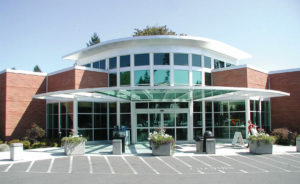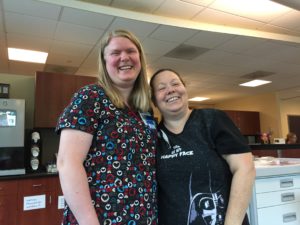If there’s one phrase Nora Gant has heard dozens of times from cancer survivors, it’s this: “I feel like I’m waiting for the other shoe to drop.”
“That surprised me when I first started working with patients at the end of their treatment,” says Gant, an ARNP with the Providence Regional Cancer System, “I’ve heard that exact wording hundreds of times. As hard as it is to be in treatment, sometimes five days a week for more than a month, suddenly it stops and patients feel like they’re floating out in space and waiting for what’s next. They’re worried that they’re going to get cancer again. They are worried about long-term and late side effects. And they are concerned about how they will transition to their changed circumstances and lives.”
Survivorship Care Plans

Once active treatment – chemotherapy, radiation and/or surgery – is completed, Nora meets patients in a one-on-one office visit to review a care plan and treatment summary. “It’s a time to check in on how they’re doing now and what to expect down the road. But first we often address lingering questions about the diagnosis and staging.”
For many patients, the aftermath of treatment can be as challenging as the treatment itself. Well-intentioned loved ones can have a hard time relating once the crisis has passed. “People who love you are saying, ‘Good thing that’s over and now you’re back,’ ” says Gant. “But patients don’t feel ‘back.’ They may not regain their energy three months or even six months after treatment ends. It can take up to a year or more. In the meeting, we talk about the ‘new normal’ with topics including fatigue, anxiety, sexuality, etc. The long-term effects often don’t come to the surface until after treatment ends. The issue of sexuality is often very significant but not talked about. I ask everyone about that. They may or may not have a need to discuss it, but opening that door is very important. We also address medical issues (including future cancer screening), that post-treatment patients and their primary care providers need to know.”
Gant is continuously inspired by the patients in the program. “The things I hear people say are so profound,” she says. “Many of them reshuffle their priorities and come out with clarity, which can be empowering. The process can also be really hard. We’re here to help the patient and their loved ones through the process.”
To learn more about Survivor Care Plans & Treatment Summaries, call Nora at 360-493-4504.
Quality Care, Close to Home

In addition to Survivor Care Plans and Treatment Summaries, Providence Regional Cancer System is a fully integrated cancer program that offers whole person care services which support the mind, body and spirit.
Clinic locations include:
- Lacey
- Centralia
- Aberdeen
- Shelton
- Yelm
A number of classes and programs and resources are available to help patients and their loved ones understand and cope with a cancer diagnosis, treatment and post-treatment issues. Cancer 101: Basics and Beyond is a no-cost evening presentation with medical and supportive care experts who explain what patients can expect, from diagnosis through treatment and beyond. The program includes dinner and a variety of resources for participants to take home with them.

Examples of other services include:
- Nurse Navigators
- Genetic Testing and Counseling
- Integrative Cancer Care
- Clinical Trials
- Oncology Rehabilitation and Lymphedema Program
- Robotic Assisted Surgery
- Palliative Care
- Spiritual Care
- Social Work and Counseling
- Living with and Beyond Cancer
- Survivor Celebration Day event (first Saturday in June)
- Support Groups
For more information on any of the Providence Regional Cancer System offerings, call 360-754-3934.




















































